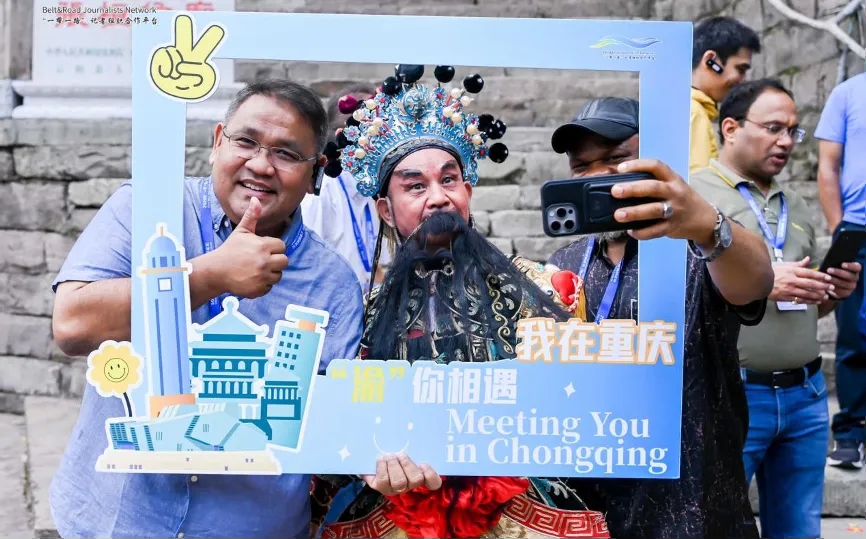Foreign journalists immersed in traditional Chinese culture | Media Tours
On August 28, leaders from journalists' organizations and media outlets from the Belt and Road Journalists Network (BRJN) visited Zhang Fei Temple and experienced the charm of traditional Chinese medicine in Southwest China's Chongqing.
The temple, built to honor the famous Shu Han general Zhang Fei from the Three Kingdoms period, left a profound impression on the visitors. The stories of the Three Kingdoms, a hallmark of Chinese culture, are well-known internationally. At Zhang Fei Temple, journalists paused to listen to the history of the temple's relocation, enjoyed theatrical performances, and explored the art of Chinese rubbings, immersing themselves in the beauty of traditional Chinese culture.

At Zhang Fei Temple, guests immersed themselves in the beauty of traditional Chinese culture. (Photo/WCICO)
"My first impression is magnificent. Everything is charming and full of good energy. The city is beautiful, ancient, and impressive. I believe this city has a great future ahead. My country, Egypt, is also ancient, with a 7,000-year-old civilization. Like China, we share feelings of greatness and history. This makes me feel like I am at home. As a journalist, I feel it's my duty, along with my colleagues worldwide, to talk about what we've seen here. We need more publicity and focus on the greatness and beauty of these cities in China."
Christopher Isiguzo, President of the Nigeria Union of Journalists, emphasized the importance of cultural preservation, saying, "China's unique approach to preserving traditional culture lies in its continuity. This ancient temple has stood the test of time because generations have continuously maintained and protected it. Today, Zhang Fei Temple is like a treasure, revealing its cultural and historical value. This sends a strong message to the rest of the world: we must act swiftly to protect historical monuments and our cultural heritage."
During their visit to Chongqing Sanxia Yunhai Pharmaceutical Co Ltd, the guests were treated to a rich array of traditional Chinese medicine (TCM) experiences, including herbal tea tasting, moxibustion, massage, cupping therapy, and pulse diagnosis.
The display area showcasing various Chinese medicinal herbs sparked considerable interest among the guests. They eagerly returned to their journalistic roots, taking out their phones and cameras to ask the staff questions such as, "What are the processes involved in manufacturing Chinese medicine?" "How does traditional Chinese medicine differ from Western medicine?" "How is the supply of medicinal herbs ensured?" and "What are the most commonly used Chinese herbs?" Of course, the most frequently asked question was whether herbs from their home countries were used in these traditional Chinese medicines.
Saleh Mahfoodh Mubarak Al Qasmi, a media expert of the Oman Journalists Association and General Manager of Majan TV Channel, had just experienced traditional Chinese cupping therapy.

One journalist experienced traditional Chinese cupping therapy. (Photo/WCICO)
He said, "Today, we experienced the essence of traditional Chinese culture, and it was truly impressive! The Chinese people are hardworking and wise, using very safe methods to relieve people's ailments. It's extraordinary. This is the essence of traditional medicine and culture, something that is awe-inspiring and deserves our utmost effort to protect and pass on."


